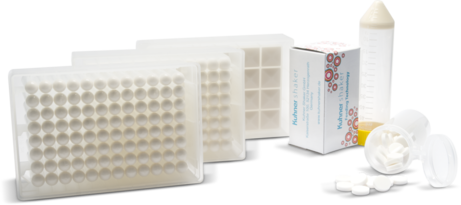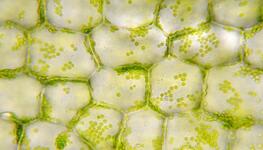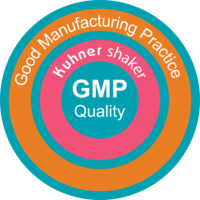to view content for your location.



The Kuhner Feeding Technology provides an innovative tool for efficient high-throughput screenings in fed-batch mode. The diffusion-driven fed-batch system is delivered sterile and ready-to-use for the instant application in the lab. The Kuhner Shaker GmbH offers three items applying the Kuhner Feeding Technology: Feed Plate® , FeedBeads® and FeedTubes®.
By using the fed-batch mode instead of batch cultivations, overflow metabolism with undesired side-product formation can be significantly reduced and oxygen limited conditions can be avoided. Thereby, screening results are improved and a higher product formation is achieved.

Superior outcome in screening

For efficient scale-up

Reproducible results

Application
Using the Kuhner Feeding Technology, cultivation conditions of the strain screenings are more comparable to those on a production scale, since overflow metabolism, pH inhibition, and oxygen limitation are prevented. Thus, an unfavorable strain selection is avoided already early on. Comparable and reproducible conditions in screening allow you to identify the optimal production strain already at an early time point. Consequently, this reduces costs as well as time-consuming process adaptations during later stages in process development.

Universal tool
for MTP, shake QWflasks and tubes

Various substrates and release rates
for individual needs

Fast and easily integrated
sterile and ready-to-use
Reducing negative influences
O2-limitation, by-products and overflow, pH-shifts
Improving Screening
controlled cell metabolism and higher significance of results
Simplified scale-up
starting process development one step earlier
Selection of the best strain
for later production process
High product yields
improved cell metabolism
extended cultivation time
Reduction of costs
avoidance of unforeseen development costs
| Type | Article | Substrate | Release after 48 h * |
|---|---|---|---|
| 96 well, round | SMFP00701 | Glucose | 3 mg |
| 96 well, round | SMFP01001 | Glucose | 5 mg |
| 96 well, round | SMFP04001 | Glucose | 9 mg |
| 96 well, round | SMFP08001 | Glucose | 10 mg |
| 96 well, square | SMFP00702 | Glucose | 4 mg |
| 96 well, square | SMFP01002 | Glucose | 6 mg |
| 96 well, square | SMFP04002 | Glucose | 12 mg |
| 96 well, square | SMFP08002 | Glucose | 14 mg |
| 48 well, round | SMFP08004 | Glucose | 23 mg |
| 24 well, eckig | SMFP00703 | Glucose | 18 mg |
| 24 well, eckig | SMFP01003 | Glucose | 30 mg |
| 24 well, eckig | SMFP04003 | Glucose | 48 mg |
| 24 well, eckig | SMFP08003 | Glucose | 60 mg |
| Type | Article | Substrate | Release after 48 h * |
|---|---|---|---|
| 96 well, round | SMFP11001 | Glycerol | 3.5 mg |
| 96 well, round | SMFP12001 | Glycerol | 6.5 mg |
| 96 well, square | SMFP11002 | Glycerol | 5 mg |
| 96 well, square | SMFP12002 | Glycerol | 10 mg |
| 48 well, round | SMFP11004 | Glycerol | 10 mg |
| 48 well, round | SMFP12004 | Glycerol | 19 mg |
| 24 well, square | SMFP11003 | Glycerol | 27 mg |
| 24 well, square | SMFP12003 | Glycerol | 40 mg |
| Type | Article | Substrate | Release after 48 h * |
|---|---|---|---|
| 96 well, round | SMFP02701 | Glucose | 15 mg |
| 96 well, square | SMFP02702 | Glucose | 18 mg |
| 48 well, round | SMFP02704 | Glucose | 36 mg |
| 24 well, square | SMFP02703 | Glucose | 100 mg |
* Release determined at 37 ° C in 10 mM PBS buffer, pH 7.4
For your high-throughput screening, we recommend that you check the substrate release under your own cultivation conditions and with your own media.
For samples, orders or a personal consultation contact us!
Packing size: 25 beads / pack
| Article | Bead size | Substrate | Release after 48 h * |
|---|---|---|---|
| SMFB01001 | Ø 12 mm, h= 3 mm | Glucose | 32 mg |
| SMFB02001 | Ø 12 mm, h= 3 mm | Glucose | 40 mg |
| SMFB08001 | Ø 12 mm, h= 3 mm | Glucose | 75 mg |
| SMFB08002** | Ø 24 mm, h= 3 mm | Glucose | t.b.d. |
| **packaging size: 20 beads/pack | |||
| Article | Bead size | Substrate | Release after 48 h * |
|---|---|---|---|
| SMFB78011 | Ø 12 mm, h= 3 mm | Glutamin | t.b.d. |
| Article | Bead size | Substrate | Release after 48 h * |
|---|---|---|---|
| SMFB11001 | Ø 12 mm, h= 3 mm | Glycerol | 28 mg |
| SMFB12001 | Ø 12 mm, h= 3 mm | Glycerol | 40 mg |
* Release determined at 37 ° C in 10 mM PBS buffer, pH 7.4
For your high-throughput screening, we recommend that you check the substrate release under your own cultivation conditions and with your own media.
For samples, orders or a personal consultation contact us!
Kuhner FeedingTechnology
Fed-Batch Micro Plates
Fed-batch Mode in Shake Flasks
In our Science Room, we provide general information and data on cultivation processes in Shaken bioreactors.
Learn how to perform a fed-batch in a microtiter plate.
Discover more about Feeding Technology on our website: https://www.feedingtechnology.com
The FeedPlate® allows the simulation of a Fed-Batch cultivation on a very small scale. Using the FeedPlate®, you can easily obtain reliable statements how your strains behave under Fed Batch conditions in the screening process.
The FeedPlate® consists of a commercially available microtiter plate with our special polymer matrix at the bottom of each well immobilized. This matrix contains the substrate.
The FeedPlate® is a polymer-based release system. After the microtiter plate comes into contact with culture medium, the release of the substrate starts according to an evendefined rate over a period of up to 7 days.
No. The Feed Plate® is a physicochemical system and does not require enzymes or special media or additives. The release kinetics is mainly dependent on the temperature and osmolarity of the medium used. Therefore, we refer to the release rate in the product catalog to a reference medium or cultivation conditions.
The FeedPlate® is currently available as standard in 24-well, 48-well and 96-well format, which allows you to process many samples in parallel in a reliable manner. This allows you to screen easily and quickly in high throughput.
The FeedPlate® is available in commercially available microtiter plate formats. You choose which format you want to use. We produce special formats on request.
No problem, we can theoretically dose our matrix into any type of microtiter plate (cell culture tubes, 6-, 12-, 24-, 48- or 96-well MTPs), also different materials (PP, PS, etc.) or plates from certain manufacturers are possible (on request).
In addition to the standard carbon source glucose, we also offer other substrates such as maltose and fructose, and complex media such as yeast extract or other substrate classes such as nitrogen and phophate are also possible. Please contact us!
Yes, that is not a problem. As long as you cultivate in Fed-Batch mode, oxygen supply should not be a problem. If you have any questions about how to reach a specific OTR, we will be happy to advise you and provide appropriate literature.
The FeedPlate® should be stored dry at room temperature. Direct sunlight should be avoided.
The substrates are usually incorporated into the matrix as stable crystalline substances. Shelf life is therefore a question of sterility. The Feed Plate® is sterilized by beta radiation and is at least durable for one year.
Contact us: Call us or write us an e-mail. We will be happy to answer your open questions.
The following flyers provide information about the machines and function-specific solutions.
Kuhner shakers are suitable for the cultivation of microbial, plant, human and animal cell cultures. Find more information about the different application areas and suitable product recommendations for optimal cultivation here.




Adolf Kühner AG (Headquarters)
Dinkelbergstrasse 1
CH-4127 Birsfelden (Basel)
Switzerland
We support our customers in implementation, maintenance and repair of all Kuhner products – efficiently and competently.
For Kuhner, the quality and durability of their shakers and bioreactors have always been the topics with the highest priority. On this account, Kuhner products have also proven their worth worldwide under GMP requirements. Documentation, development and production along the full life cycle of our products are continuously enhanced to match the requirements of 21 CFR and GAMP 5.
Read more

The world's most reliable shaking machines built in-house in Switzerland.